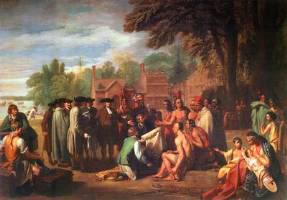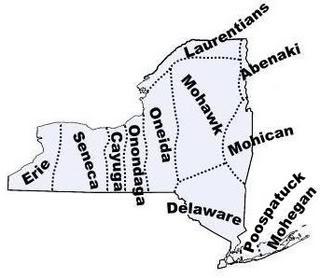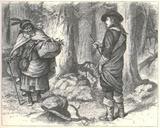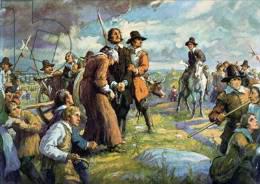Lucy Buck from Front Royal, Virginia kept a diary of the events she witnessed from December 1861 to April 1865. Her diary entries describe daily life at her home with an extended family that included parents, a grandmother, aunts, cousins, younger siblings and visitors. Image: Bel Air, the home of Lucy Buck As taken from a sketch made in 1860 From her diary, Sad Earth, Sweet Heaven Early Years Lucy Rebecca Buck was born on September 25, 1842, in Warren County, Virginia, the third of thirteen children. She learned the social graces at two local schools. Lucy was 18 years old when the Civil War began, and she lived with her family in Front Royal, Virginia, throughout the war. Built…

Sarah Good
Salem Witch Trials Seventeenth century laws on witchcraft in New England paralleled those in England, based on a verse from the King James translation of the Bible. The verse, Exodus 22:18, reads “Thou shalt not suffer a witch to live.” The King James version of the Bible was ordered by King James I, who ruled from 1603 to 1625. By 1647, all New England colonies had made witchcraft a capital crime, punishable by death. Sarah Solart was the daughter of a prosperous Wenham innkeeper, John Solart. Solart took his own life by drowning in 1672 when Sarah was 17, leaving an estate of 500 pounds. After testimony of an oral will, the estate was divided between his widow and her…

Pennsylvania Colony
The Year: 1682 Image: William Penn’s 1682 treaty with the Lenape Benjamin West Painting In 1661, the year after Charles II was restored to the throne of England, William Penn was a seventeen-year-old student at Christ Church, Oxford. His father, a distinguished admiral in high favor at Court, had abandoned his erstwhile friends and had aided in restoring King Charles to the throne again. Born to all the advantages of the landed aristocracy of England, Penn was sent to the finest English schools and on a grand tour of the continent by his father, Admiral Sir William Penn, conqueror of Jamaica.
Melcenia Elliott
Among the heroic and devoted women who labored for the soldiers of the Union in the Civil War, and endured all the dangers and privations of hospital life, was Miss Melcenia Elliott of Iowa. Born in Indiana, and reared in the northern part of Iowa, she grew to womanhood amid the scenes and associations of country life, with a generous nature, superior physical health, and a heart warm with the love of country and humanity. Her father was a prosperous farmer, and gave three of his sons to the struggle for the Union, who served honorably to the end of their enlistment, and one of them re-enlisted as a veteran, performing the perilous duties of a spy, that he might…

Native American Tribes of New York
Native Americans of New York Image: Tribal Territories in New York The Abenaki Abenaki is actually a geographical and linguistic (rather than political) grouping. Before contact with Europeans, individual tribes were the usual level of political organization. Occasionally, several tribes would unite under a powerful sachem (chief) for purposes of war, but the Abenaki were noteworthy for their general lack of central authority. Even at the tribal level, the authority of their sachems was limited, and important decisions, such as war and peace, usually required a meeting of all adults. In many ways, the lack of a central government served the Abenaki well. In times of war, they could abandon their villages, separate into small bands, and regroup in a…

Tituba
Accused of Witchcraft Image: Tituba’s Encounter with Cotton Mather in the Woods of Salem A scene from the play Giles Corey of the Salem Farms Illustration in The Political Works of Henry Wadsworth Longfellow, Volume II Tituba was a South American Indian woman, not an African American slave, as is commonly believed. She was originally from an Arawak village in South America, where she was captured as a child, taken to Barbados and sold into slavery. It was in Barbados that her life first became entangled with that of Reverend Samuel Parris.
Mary Morris Husband
Civil War Nurse from Pennsylvania Mary Morris Husband was a well known Pennsylvania nurse, whose illustrious career found her serving the physical, psychological and legal needs of the men in her care. She was known as the nurse with the apron of miracle pockets, because her deep, wide pockets carried games and reading material that entertained and filled the soldiers’ long hours of recovery. Born in Philadelphia, Pennsylvania, Mary Morris was the granddaughter of Robert Morris, Revolutionary War financier and signer of the Declaration of Independence. She married a prominent and wealthy Philadelphia attorney, J. I. Husband. Her husband, her two sons and herself constituted her household at the beginning of the Civil War. Patriotic instincts were strong in the…

Salem Witch Trials
Witchcraft in 17th Century Massachusetts Image: Witchcraft Victims on the Way to the Gallows Illustration in the Boston Herald 14 May 1930 Scattered episodes of witch trials and hangings occurred throughout New England from the middle sixteen hundreds. The only escape for the accused or condemned was to confess and claim to negate the pact with the Devil, or to escape south out of New England to New York or Pennsylvania where witchcraft was not punished. Most of the accused were not wealthy enough to escape south fast enough to stay ahead of the sheriff sent to detain them.

Iroquois Women
Women in Iroquois History Image: Jigonsaseh Head Clan Mother of the Iroquois The Iroquois were one of the most powerful Indian races, controlling land all the way down the eastern seaboard of North America and several hundred miles inland. A woman’s place in Iroquois culture was very different from that in European cultures. Iroquois women enjoyed social equality and respect that was not shared by colonial American women. The Iroquois Confederacy was composed of five different tribes, who banded together shortly before European contact. The tribes of the Iroquois Confederacy and other Northern Iroquoian-speaking peoples, including the Huron, lived in the region including what is now New York State and the Great Lakes area.
Frances Dana Gage
Writer, Abolitionist and Women’s Rights Activist Frances Dana Gage was a leading reformer, feminist and abolitionist. She worked closely with other leaders of the early women’s rights movement. She was among the first to champion voting rights for all citizens, without regard to race or gender. Childhood and Early Years On October 12, 1808, Frances Dana Barker was born in Union, Ohio. Her parents were among the first settlers in the United States Northwest Territory. A farmer’s daughter, Frances was educated at a log cabin in the woods, spun the garments she wore, made cheese and butter, and did outdoor chores. Frances made frequent visits to her grandmother, Mary Bancroft Dana, whose home was at Belpre, Ohio. Mary Dana was…